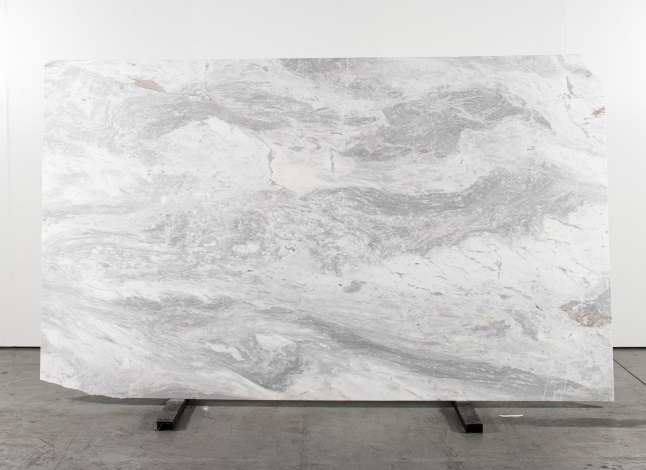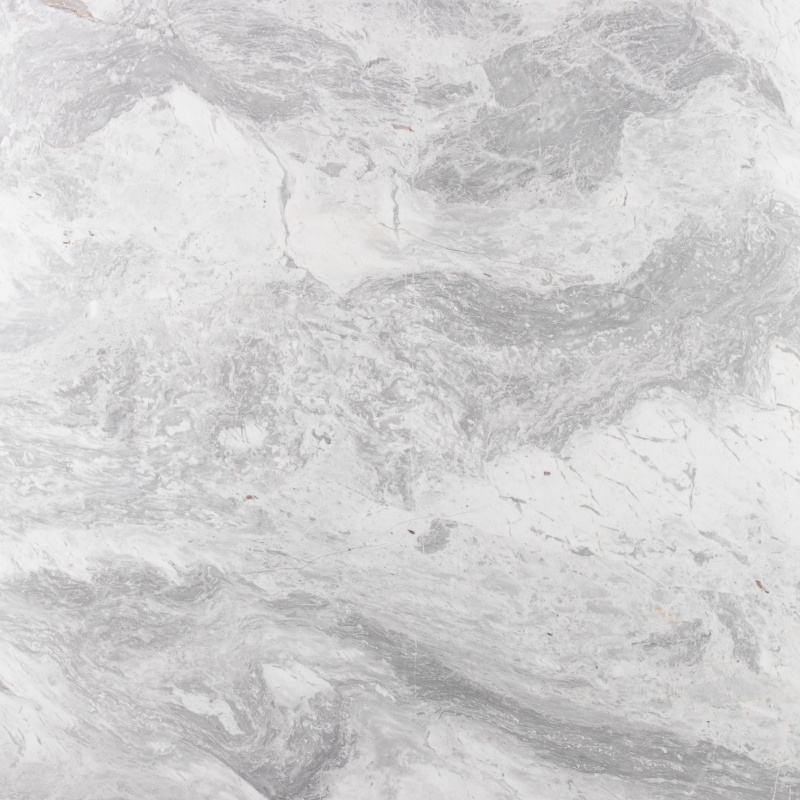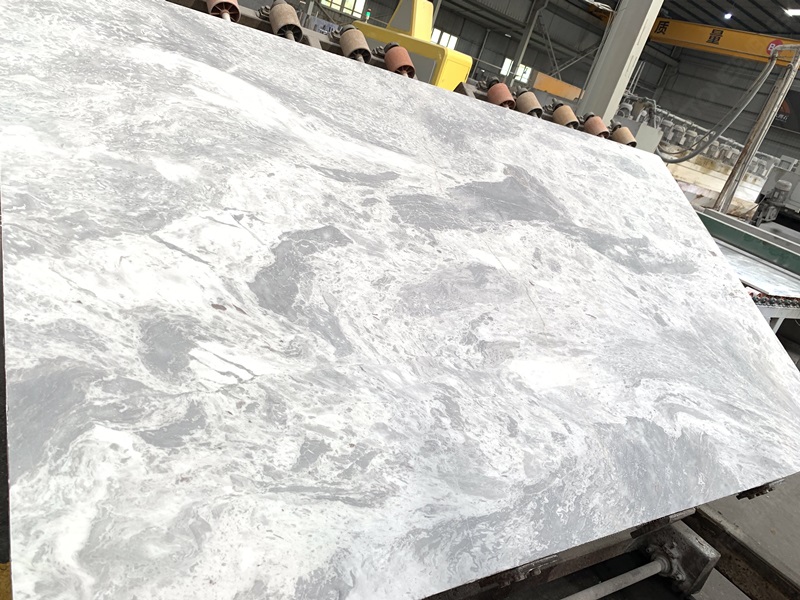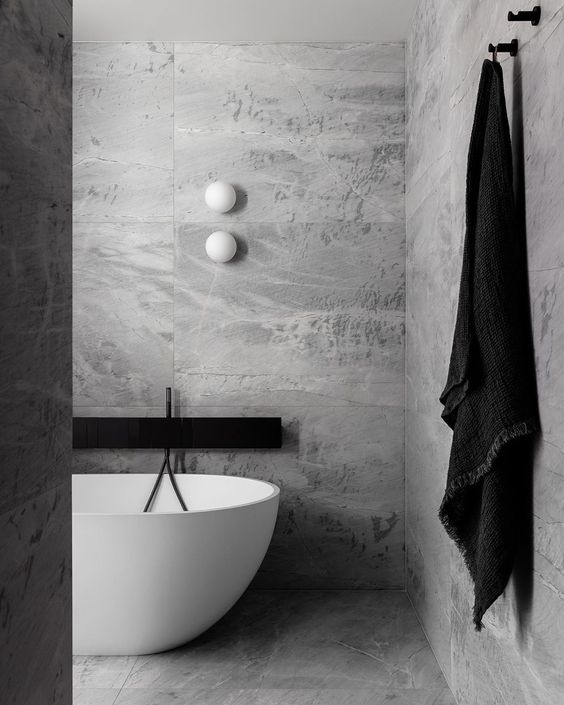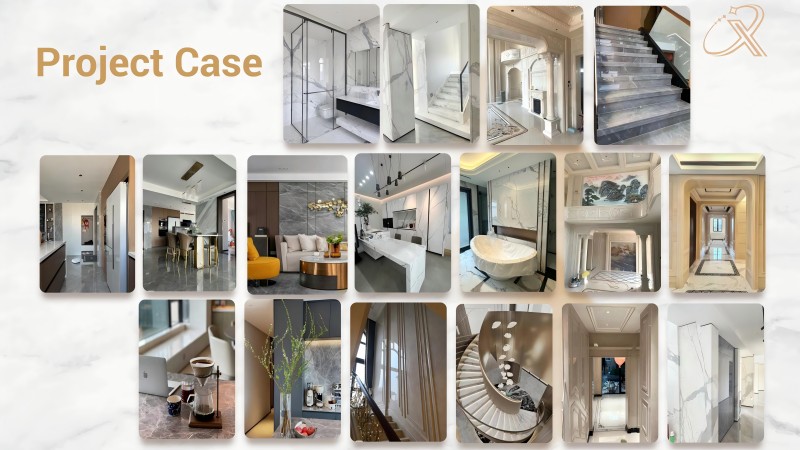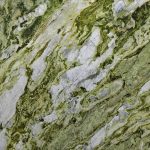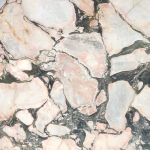Elba White Marble
Elba White Marble is a premium, natural stone known for its luxurious appearance and elegant design, often used in high-end interior and exterior applications. It is sourced from Elba Island in Italy, which is famous for producing some of the finest marbles in the world. Elba White Marble is particularly prized for its pure white background with delicate light gray veins, creating a sophisticated, clean, and timeless aesthetic. This stone is used in a variety of applications, from countertops and flooring to wall cladding and decorative features.
Key Characteristics of Elba White Marble:
- Color and Veining:
- Base Color: The base color of Elba White Marble is a crisp, bright white, which provides a clean, fresh look that complements a wide range of design styles.
- Veining: It typically features soft gray veins that may run in a linear or organic pattern, creating a delicate contrast against the white background. The veins can vary in intensity and width, with some slabs showcasing fine, subtle lines and others displaying more prominent veins.
- Appearance: The overall effect is one of understated elegance, with the marble offering a refined, contemporary aesthetic that pairs well with both traditional and modern interiors.
- Texture and Finish:
- Smooth Surface: Elba White Marble is typically polished to a high-gloss finish, which enhances its natural beauty and gives it a reflective quality. The polished surface emphasizes the contrast between the white background and gray veins, making it ideal for luxury applications.
- Honed Finish: It can also be honed (matte finish), which gives the stone a softer, more subtle appearance, ideal for spaces where a less reflective surface is preferred, such as floors or walls in high-traffic areas.
- Durability:
- Softness: Like most marbles, Elba White is a relatively soft stone compared to granite or quartzite. It ranks around 3-4 on the Mohs scale of hardness, which means it can be prone to scratches and surface damage if not properly maintained.
- Porosity: Marble is a porous material, which makes it susceptible to staining, particularly from acidic substances like wine, coffee, and citrus. Proper sealing is required to maintain its pristine appearance and protect it from staining and moisture absorption.
- Applications:
- Countertops: Elba White Marble is a popular choice for luxury kitchen countertops and bathroom vanities. Its bright, clean aesthetic adds sophistication and elegance to these spaces.
- Flooring: It is often used for high-end flooring in residential or commercial projects, especially in areas like entryways, living rooms, and bathrooms.
- Wall Cladding: This marble is also widely used for wall cladding and backsplashes, especially in bathrooms, kitchens, or other spaces where a clean, elegant look is desired.
- Decorative Features: Elba White Marble is used in a variety of decorative elements, including fireplace surrounds, columns, and staircases. It can also be used for mosaic patterns or other artistic installations.
- Design Versatility:
- Elba White Marble’s clean white appearance and subtle gray veining make it an excellent choice for both modern and classic interiors. It works beautifully with a wide range of design styles, from minimalist to traditional and contemporary. It can be paired with bold accent colors or used in more neutral, understated spaces for a serene, elegant atmosphere.
- Sustainability and Sourcing:
- Italian Sourcing: Elba White Marble is quarried on Elba Island, Italy, a region known for its high-quality marble. As an Italian marble, it carries a certain level of prestige and recognition in the design world.
- Sustainability: Like many natural stones, marble is a natural resource. Sustainable practices in quarrying and production are important considerations for eco-conscious consumers. Choosing a supplier that ensures responsible sourcing and minimal environmental impact is an important factor to consider when purchasing Elba White Marble.
How does compare Elba White Marble to other natural stones in terms of durability?
Elba White Marble is a luxurious natural stone, but when it comes to durability, it is important to understand how it compares to other natural stones such as granite, quartzite, and limestone. Each of these stones has its own set of characteristics that affect their performance in different environments. Here’s how Elba White Marble stacks up in terms of durability compared to other popular natural stones:
1. Hardness (Mohs Scale of Hardness)
- Elba White Marble: Marble, including Elba White Marble, is relatively soft compared to other natural stones. It ranks around 3 to 4 on the Mohs scale of hardness, meaning it can be scratched or etched by harder substances like metal or certain stones.
- Granite: Granite is significantly harder than marble, ranking around 6 to 7 on the Mohs scale. It is much more resistant to scratching and abrasion, making it ideal for high-traffic areas such as kitchen countertops.
- Quartzite: Quartzite is even harder than granite, typically ranking around 7 to 8 on the Mohs scale. It is highly resistant to scratching and wear, making it an excellent choice for durability.
- Limestone: Limestone is softer than marble, generally ranking around 3 to 4 on the Mohs scale. Similar to marble, it can be scratched and is more prone to wear over time.
Comparison: Elba White Marble is much softer than both granite and quartzite, making it more prone to scratching and damage from heavy use. It is not as hard as granite or quartzite, but it is on par with limestone in terms of softness.
2. Porosity and Stain Resistance
- Elba White Marble: Like most marbles, Elba White Marble is highly porous. This means it can absorb liquids and is prone to staining from substances like wine, coffee, citrus, and oils. It is crucial to apply a sealant to protect the marble from stains and etching caused by acidic substances.
- Granite: Granite is much less porous than marble and is naturally resistant to stains and liquids. It is more durable in terms of moisture resistance and does not require sealing as frequently as marble.
- Quartzite: Quartzite is extremely durable and non-porous, making it resistant to staining, much like granite. It does not require sealing as often, and when sealed, it provides excellent protection against liquids.
- Limestone: Limestone is similarly porous to marble and is prone to staining, especially from acidic substances. Like marble, it benefits from sealing to prevent moisture absorption.
Comparison: Elba White Marble is more prone to staining and moisture absorption compared to granite and quartzite, both of which are more stain-resistant and require less maintenance in terms of sealing. Limestone also shares similar porosity concerns as marble.
3. Resistance to Heat
- Elba White Marble: Marble, including Elba White, has moderate heat resistance. While it can tolerate brief contact with hot items, it is not as heat-resistant as granite or quartzite. Direct contact with hot pots, pans, or other cookware can cause the marble to crack or become damaged over time. Additionally, high temperatures can cause thermal shock in marble, especially if the surface has not been properly sealed.
- Granite: Granite is highly heat-resistant and can withstand high temperatures without being damaged. This makes granite an excellent choice for kitchen countertops and areas with high heat exposure.
- Quartzite: Quartzite, like granite, is highly heat-resistant and can endure hot cookware without warping or cracking. It is suitable for kitchens with heavy cooking activity.
- Limestone: Limestone is generally more sensitive to heat and may suffer from thermal damage more easily compared to marble, granite, and quartzite.
Comparison: Elba White Marble is less heat-resistant than granite and quartzite and should be handled with more care around hot objects. Limestone is also not as heat-resistant as granite or quartzite.
4. Scratch and Abrasion Resistance
- Elba White Marble: As a softer stone, Elba White Marble is more susceptible to scratches and abrasion. Sharp objects, knives, or heavy objects can leave marks on the surface if care is not taken. It is essential to use cutting boards and avoid dragging heavy objects on the surface.
- Granite: Granite is highly resistant to scratches and abrasion, making it ideal for kitchen countertops and areas with frequent use. It can withstand knives, heavy cookware, and general wear and tear.
- Quartzite: Quartzite is even harder and more scratch-resistant than granite. It can endure daily wear and tear without showing significant signs of damage, making it a very durable choice for high-traffic areas.
- Limestone: Limestone is softer than both marble and granite, and as such, it can be scratched and worn down more easily, especially in high-traffic areas.
Comparison: Elba White Marble is more prone to scratches and abrasion than granite and quartzite, both of which offer better resistance to wear and tear. Limestone is similarly prone to scratching but is softer than marble.
5. Maintenance Requirements
- Elba White Marble: Marble, including Elba White, requires regular maintenance to keep it in good condition. This includes sealing to protect the surface from staining and etching, as well as regular cleaning with pH-neutral products. Acidic cleaners or harsh chemicals should be avoided, as they can cause permanent damage to the surface.
- Granite: Granite requires less maintenance than marble. It still needs to be sealed periodically, but it is generally more resistant to stains and surface damage. Cleaning with non-abrasive, pH-neutral products is usually sufficient.
- Quartzite: Quartzite is low-maintenance compared to marble. It still requires sealing to protect against moisture and staining, but it is generally easier to care for and clean than marble.
- Limestone: Like marble, limestone requires regular sealing and careful cleaning to avoid staining and surface damage.
What’s the Application of Elba White Marble?
Elba White Marble a range of high-end interior projects since its beauty and unusual tint are widely appreciated.
1.Elba White Marble Countertop :Elba White Marble is often used to create stunning kitchen countertops and bathroom vanity tops. Its striking white color and intricate veining add elegance and sophistication to these spaces.
2.Wall Cladding: As a wall covering,Elba White Marble can create a focal point in any room. It is used in both residential and commercial settings to enhance the visual appeal of walls.
3.Flooring: While it is less commonly used for flooring compared to harder stones like granite ,Elba White Marble still be used in areas with light foot traffic, such as bathrooms, entryways, and other interior spaces.
4.Feature Walls: The dramatic veining and color variations of Elba White Marblemake it ideal for creating accent walls or feature walls in living rooms, dining rooms, or even hotel lobbies.
5.Decorative Items: Smaller pieces of Elba White Marble, such as tabletops, fireplace surrounds, and decorative objects, can be used to add a touch of luxury and sophistication to interior design.
6.Bathroom Applications: Besides vanity tops,Elba White Marble can be used for shower walls, bathtub surrounds, and other bathroom surfaces to create a spa-like atmosphere.
7.Furniture: Custom furniture items like side tables, dining tables, and coffee tables. These works of art that are also useful elevate any room. Each furniture piece is distinctive and draws attention because of the distinctive patterns and colours of this Elba White Marble
8.Art Installations: Designers and artists frequently work with Elba White Marble to produce one-of-a-kind art installations. In galleries, public areas, and private collections, artistic works are made stand out by the depth and personality that the natural beauty of the stone provides.
What are the unique features of Elba White Marble that make it appealing for interior design?
Elba White Marble is a premium, high-quality stone known for its elegance, timeless appeal, and versatility in interior design. Its unique features make it a sought-after material for luxury design projects, offering a refined aesthetic that works well in both contemporary and traditional spaces. Here are the key characteristics of Elba White Marble that make it particularly appealing for interior design:
1. Sophisticated Color Palette
- Crisp White Base: Elba White Marble has a bright, clean white base that provides a luminous, fresh look. This neutrality makes it highly versatile and easy to integrate into any design style, from minimalist modern interiors to more traditional and classic aesthetics.
- Delicate Gray Veining: The subtle light gray veins running throughout the marble offer a delicate contrast to the white background, creating a visually interesting yet understated pattern. The veining can be linear or organic, with varying intensities, which adds to the uniqueness of each slab.
- Soft Contrast: Unlike more bold veined marbles, the light gray veins in Elba White Marble provide a soft, elegant contrast that doesn’t overpower the space. This creates a calm, serene atmosphere perfect for relaxing environments like bathrooms or living rooms.
2. Timeless Elegance
- Luxurious Aesthetic: Elba White Marble is often associated with luxury and high-end design. Its classic beauty has been a staple in historic architecture and remains highly desirable in modern interior design. The timeless nature of white marble ensures that it won’t go out of style, making it a solid investment for both residential and commercial spaces.
- Versatility: The neutral tones and refined look of Elba White Marble allow it to complement a wide range of design styles, from traditional to contemporary. It can easily fit into a variety of spaces, whether it’s used in a modern kitchen or as a feature in a luxurious hotel lobby.
3. Light Reflective Qualities
- Brightens Spaces: The polished finish of Elba White Marble enhances its reflective properties, helping to brighten and open up spaces. The natural light bouncing off the surface can make smaller rooms feel more expansive, and it works particularly well in spaces that want to evoke a sense of cleanliness and openness.
- Creates Airy Ambiance: Its bright white tones create a fresh and airy feel, making it ideal for creating light-filled, inviting environments. This makes it particularly suitable for smaller rooms, bathrooms, and living areas that could benefit from a sense of spaciousness.
4. High-Quality Appearance
- Luxurious, Pristine Look: The consistent white background with soft veins gives Elba White Marble a high-end, pristine appearance that is perfect for those looking to create a refined, polished aesthetic. The clean lines and subtle patterns make it highly photogenic, ideal for spaces that showcase sophisticated design.
- Unique Slabs: Because no two slabs of marble are exactly alike, Elba White Marble offers a unique and one-of-a-kind appearance. The veining patterns and shades of white can vary slightly between slabs, ensuring that each installation is unique and adds an element of individuality to the design.
5. Versatility in Applications
- Countertops and Vanities: Elba White Marble is a popular choice for luxurious countertops in kitchens and bathrooms. Its clean, neutral color makes it a great option for modern, high-end kitchens, while its reflective quality brightens up the space.
- Wall Cladding: Elba White Marble is frequently used for wall cladding, particularly in bathrooms, shower enclosures, and feature walls. The polished surface of the marble gives walls a sophisticated look, making it an excellent choice for upscale design.
- Floors: In high-end homes or commercial spaces, Elba White Marble can be used for flooring, offering a polished, smooth finish that adds class and elegance to any space. Its neutral tones make it compatible with various furniture styles and design elements.
- Fireplace Surrounds and Other Accents: The marble’s versatility allows it to be used for more specialized applications like fireplace surrounds, columns, and even mosaic designs. It can be used to create focal points in rooms, drawing attention without overwhelming the space.
6. Simplicity and Minimalism
- Modern Aesthetic: The soft, understated elegance of Elba White Marble aligns well with minimalist design. Its simplicity allows it to create clean lines and smooth surfaces that form the foundation of modern interiors. The marble’s subtle veining adds texture without detracting from the overall design concept.
- Uncluttered Look: For those who prefer a simple and sleek design, Elba White Marble serves as a perfect material to build uncluttered, spacious interiors. Its smooth surface and light tones contribute to a clean, calming environment.
- Complementing Other Materials: Elba White Marble pairs well with metallic accents, wood, glass, and other natural stones, making it an ideal complement to contemporary furniture and decor.
7. Durability with Proper Care
- Long-Lasting Beauty: While marble is a softer stone and requires proper care and maintenance, Elba White Marble is still a durable material for spaces with moderate traffic. When sealed and properly maintained, it can retain its beauty for many years.
- Patina Over Time: Some people appreciate how marble develops a patina as it ages, adding character and depth to the stone. This natural aging process can enhance the charm of the stone over time, making it feel more personal and unique.
8. Appealing to Luxury and Design Trends
- High-End Appeal: Elba White Marble is synonymous with luxury and is often featured in upscale homes, commercial spaces, and prestigious hotels. Its ability to make spaces feel more opulent is one of the reasons it’s so sought after in the interior design world.
- Timeless Trend: White marble is a staple in both classic and modern design. As design trends evolve, marble remains a material that continues to resonate with consumers who appreciate timeless beauty.
Factors affecting Elba White Marble price?
The price of Elba White Marble can vary significantly depending on several factors, including the quality, rarity, sourcing, and the specific applications for which the marble is being used. Here are the key factors that affect the price of Elba White Marble:
1. Quality of the Marble
- Veining Pattern: The intensity, consistency, and clarity of the veining can significantly affect the price of Elba White Marble. Slabs with more pronounced and intricate veining are often more expensive, as they are considered more desirable and visually appealing. Some buyers prefer marble with more subtle or uniform veining, which may be priced lower.
- Color Consistency: High-quality Elba White Marble will have a consistent white base with minimal variations or discolorations. If the marble slab has a more pure white background without imperfections, it is generally priced higher.
- Slab Size and Thickness: Larger slabs or those with greater thickness will typically cost more. Larger slabs are especially valued for luxury applications, where uniformity and scale are crucial (e.g., in large kitchen islands or expansive flooring).
2. Source and Origin
- Location of Quarry: Elba White Marble is quarried on Elba Island, Italy, and the proximity to the quarry can affect transportation costs, particularly in international markets. Marble from Italy, especially high-quality Italian marble, tends to be priced higher due to its premium status and the perceived luxury of Italian stone.
- Shipping and Handling: The cost of transporting marble from the quarry to the final destination (whether domestically or internationally) can add a significant portion to the final price. Import duties, customs fees, and the distance from the quarry to the buyer’s location can all influence the overall cost.
3. Processing and Finishing
- Polishing vs. Honed Finish: A polished finish, which gives the marble a glossy and reflective surface, is more labor-intensive and often more expensive. The honed finish, which is matte or satin, is typically less costly than polished marble because it requires less processing.
- Custom Cutting and Fabrication: Custom cutting, shaping, and finishing (e.g., for specific designs like intricate countertops, wall panels, or mosaics) can increase the price of Elba White Marble. This includes costs related to cut-to-size services, edge detailing, and other bespoke applications.
- Quality of Fabrication: The precision and craftsmanship required in the cutting and polishing processes will affect the final price. Higher-quality fabrication (e.g., precise cuts, flawless finishing, and attention to detail) typically results in a higher price point.
4. Demand and Market Trends
- Popularity: Marble is a highly desirable material for high-end design, and demand for certain types, such as Elba White Marble, can fluctuate based on trends in interior design. If white marble is particularly popular in the market, the price may rise due to increased demand.
- Regional Preferences: In certain regions, there may be a higher demand for Elba White Marble, especially in luxury homes, hotels, and commercial spaces. This can drive up the price in those markets. Additionally, global demand for high-end Italian marble can affect the price in different countries.
5. Rarity and Availability
- Availability of High-Quality Slabs: While Elba White Marble is not as rare as some exotic marbles, the availability of premium-quality slabs can influence its price. If the supply of high-quality Elba White Marble (with minimal imperfections, and superior color and veining) is limited, it may increase in price due to its scarcity.
- Extraction and Quarrying Challenges: The difficulty of extracting marble from the quarry, including issues related to access, environmental factors, or the quantity of usable material, can also influence its cost. If there are challenges in quarrying high-quality stone, the price may increase accordingly.
6. Finishing and Maintenance
- Sealing and Protective Coatings: Elba White Marble may require periodic sealing to protect it from staining and moisture absorption. If a marble supplier provides a sealant treatment or offers maintenance packages, the overall cost of the marble may include these services.
- Long-Term Maintenance Costs: Some buyers may factor in long-term maintenance costs when determining the price of Elba White Marble. Marble is more porous than granite or quartzite, meaning it requires more care to maintain its appearance, especially for kitchen countertops.
7. Market Competition and Suppliers
- Supplier Reputation: Prices can vary depending on the supplier or distributor you purchase from. Reputable suppliers, especially those that provide certified or premium quality Elba White Marble, may charge a premium for their products.
- Volume Purchases: If you are buying Elba White Marble in large quantities (for example, for a commercial project), suppliers may offer discounted rates based on the volume of the order. On the other hand, smaller purchases may have a higher per-square-foot price due to lower economies of scale.
8. Type of Project or Application
- Residential vs. Commercial: The use of Elba White Marble in residential projects (such as kitchens, bathrooms, and flooring) may come at a different price point compared to commercial applications (such as hotels, showrooms, or office buildings). Large-scale commercial projects may benefit from bulk discounts or different pricing based on order volume.
- Custom vs. Standard Applications: If Elba White Marble is used for custom projects (e.g., custom countertops, intricate wall panels, or unique decorative elements), the price is often higher due to bespoke design and unique specifications. Standard applications like simple flooring or basic countertops may be priced more competitively.
9. Quality of Packaging and Transportation
- Packaging Costs: High-quality packaging to protect Elba White Marble during transport (especially for international shipments) can increase the price. Marble slabs are heavy and fragile, so special packaging methods may be required to prevent damage.
- Transport Mode: The method of transportation (e.g., air freight vs. sea freight) and the distance the marble needs to travel to reach the buyer can add to the overall cost. More expensive transportation options may be used for urgent orders or for shipments requiring special handling.
Why Opt For Xiamen Funshine Stone?
1.Our design consultation service at Funshine Stone gives our customers peace of mind, high-quality stone, and professional guidance. Our expertise lies in natural stone design tiles, and we offer comprehensive “top to bottom” consulting to realize your idea.
2.With a combined 30 years of project expertise, we have worked on a vast array of projects and established enduring relationships with numerous people.
3.With a huge assortment of natural and engineered stones, including marble, granite, bluestone, basalt, travertine, terrazzo, quartz, and more, Funshine Stone is pleased to provide one of the largest selections available. It is clear that our use of the best stone available is superior.







